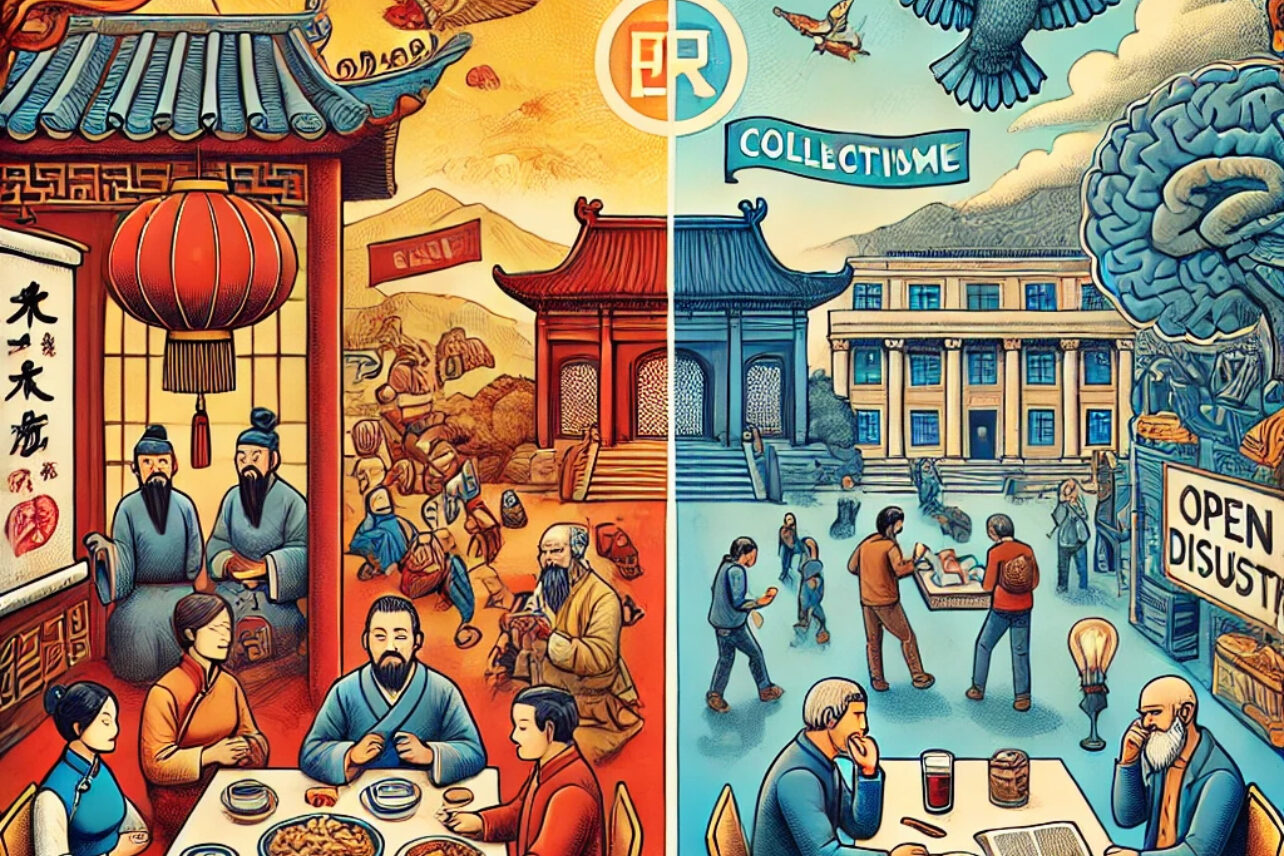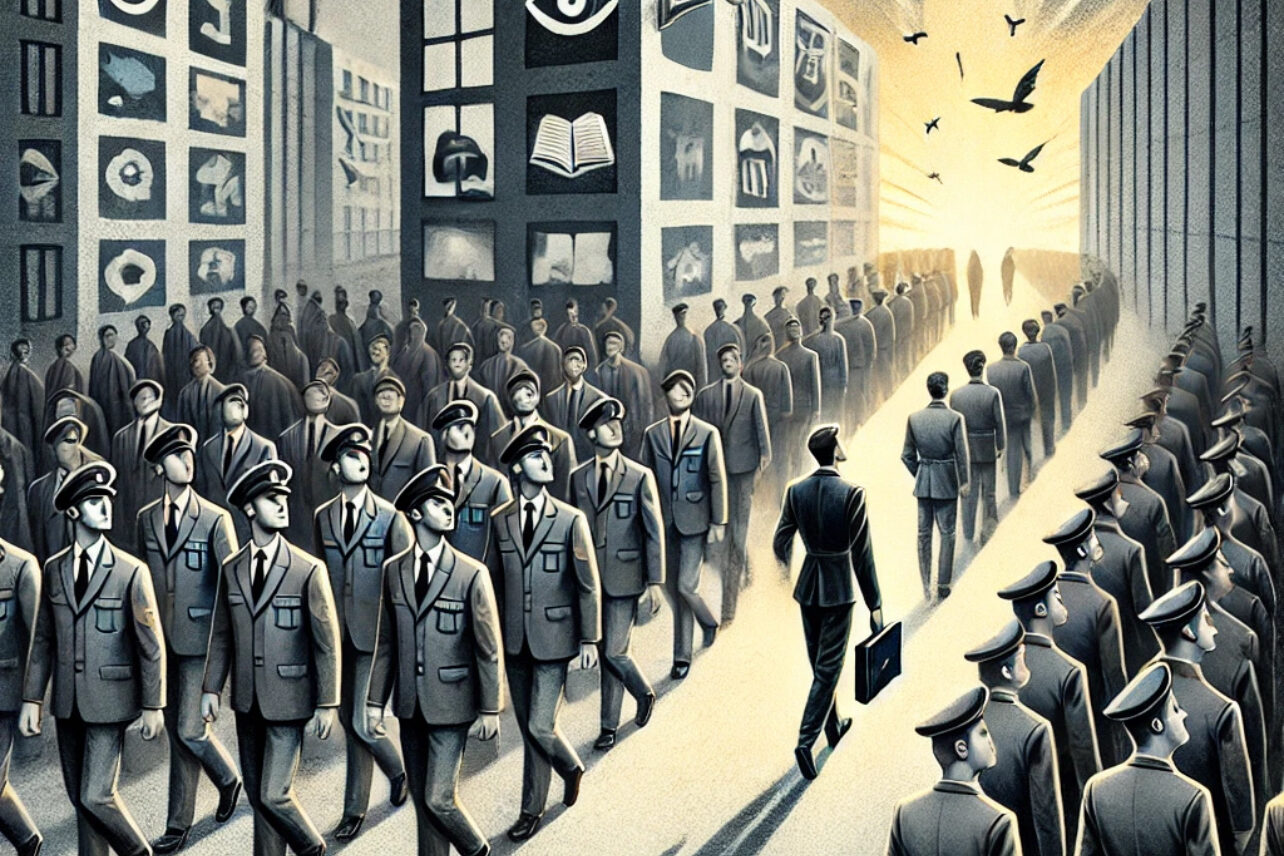在许多国家,西装象征着正式、优雅、职业精神和社会地位。它可以是企业高管的标配,是律师在法庭上的战袍,也是政治家在国际会议上的标准着装。但在中国步入2000年之后,西装的命运却有些滑稽:它不再是精英人士的象征,而是逐渐成为某些行业的“职业制服”。
如果你在大街上看到一个穿西装的人,你的第一反应可能是:房产中介、保险推销员、销售、婚庆主持人,或者酒吧经理。如果他再打上领带,可能更像是直销大会的讲师,随时准备忽悠你买课。如果他穿着全套三件套,那基本上就是婚礼司仪的标配,再加上一顶礼帽,恐怕连魔术师的业务都能兼顾了。这里并没有看轻这些行业的意思,但的确是大众的一种印象。
相反,想要在体制内获得社会尊重,穿西装显然是个糟糕的选择。你得换上一件藏青色行政夹克,配一副无框眼镜,手里拿个公文包,最好再带个保温杯,气质立马提升一个档次。无论是国企领导、政府官员,还是事业单位的“正规人士”,这样的着装才是“身份的象征”,比什么阿玛尼、范思哲都更具权威感。
在这种环境下,普通人不仅要在经济上依赖体制,还必须在文化认同上向体制靠拢。穿西装的“市场派”往往被认为是江湖气重、不够稳重,反而是行政夹克、公务员风、甚至是“土豪运动装”更能代表社会地位。因为后者象征的是体制的庇护,而前者则暗示着独立、竞争和资本的力量——这些都是极权管理者所警惕的。
但这仅仅是中国社会“服饰文化”上的一个小现象,背后折射出的却是一个更深层次的逻辑:在极权社会,文化乃至人们的信仰及其诸多方面,都不是自由发展的,而是被体制塑造的。

极权社会如何塑造文化?
在正常的市场经济环境下,文化应该是自发演变的,西装之所以在欧美、日本成为主流,是因为它确实符合职业化、现代化的需求。然而,在极权社会,文化往往不是自然生长的,而是被有意控制和引导的。
体制不希望西装成为主流,不是因为西装本身有什么问题,而是西装所代表的社会意义不符合权力需要。因为人们看到西装便会联想起欧美等国的“不当”言行,更会追溯到1215年《大宪章》让君主受制约的条条框框。而且,西装意味着商业文化,意味着市场自由竞争,而极权国家希望的是官本位,是体制至上的权力体系。因此,社会潜移默化地接受了这样一种认知:穿夹克+公文包=稳重可靠,穿西装=商业化、投机,甚至有些不太体面。前一阶段民企座谈会上的参会者也有人开始尝试着穿上了行政夹克,多数人虽穿了西装但几乎无人打领带,似乎都在表达一种“躬身入局”的谨慎姿态。
类似的文化塑造不仅仅体现在服装上,还影响到生活的方方面面:
- 影视剧要符合“主旋律”,不能挑战权力结构;
- 网络言论要“有序管理”,让人们自觉避开敏感话题,但“五毛”可以有组织的发表针对某个话题的敏感话题;
- 历史教育要“正确导向”,塑造一个符合官方叙事的历史观;
- 社会审美也要控制,比如提倡“素颜”“纯天然”,但并不是出于对真实美的追求,而是希望人们“不过度追求个性化”,避免过多的自由表达。
这些塑造方式并非强制性的,但它们通过教育系统、媒体宣传、政策引导等方式长期影响社会,使得人们潜移默化地接受“体制所希望的文化”,并将其视为“社会常识”。
信仰的困境:当基督徒生活在极权社会
在这样一个文化被操控的环境下,信仰当然也不会例外。基督信仰,本应是一种关乎个人灵魂与自由的选择,却在极权国家里被赋予了另一层含义。在体制的眼中,基督教不是简单的宗教,而是一种可能挑战现有秩序的思想体系。因为基督教强调祂可以代表每个信徒与上帝的直接联系,而不是对世俗权力的绝对服从。它提倡真理、正义、爱,对至高者上帝顺服而不是盲目的顺从偶像,这正是极权社会最害怕的东西。
基督教,作为一个强调个人与上帝直接关系的信仰体系,与极权体制天然存在张力。极权体制希望人们信任国家、服从组织、依赖权力,而基督信仰则强调顺服神、追求真理、行公义好怜悯。因此,在极权社会,基督徒往往面临三种挑战:
1. 信仰被边缘化,甚至污名化:在某些官方舆论中,基督徒被刻意塑造成“落后”、“不合时宜”甚至“愚昧迷信”的形象,在打击邪教组织时会指桑骂槐的暗指家庭聚会也是非法组织,将三自教会纳入政府意识形态管辖范围之内,等等。比如,一些媒体在宣传时,会故意将基督徒描绘成“脱离现实、盲目相信上帝解决一切问题”的群体,而不会展现他们在社会中的爱心行动、公益贡献、精神力量。
2. 信仰被“政治化”或“民族化”:极权体制不会直接否定信仰,但它会试图改造信仰,使之变成对政权有利的工具。比如,推动所谓的“宗教中国化”,要求教会宣讲国家政策、挂国旗、甚至修改圣经内容,让信仰变成政治宣传的一部分,而不是独立的精神追求,更不鼓励基督徒在社会和人生中大胆追求真理和自由。
3. 信仰带来现实风险:在体制内工作的基督徒往往最能感受到这种张力。如果在国企、事业单位、政府机关等环境中,公开表达自己的信仰,可能会被认为“不够政治可靠”,影响职业发展,甚至可能受到一定的打压甚至党纪处分。因此,很多体制内的基督徒选择低调信仰、谨慎表达,甚至有些人逐渐与信仰疏远,以适应环境。
如何在极权社会持守信仰与追求自由?
面对这样的现实,基督徒该如何在不失去信仰的同时,保持生活的自由?
1. 在日常生活中活出信仰:即便不能公开宣讲信仰,一个人的行为、态度、处事方式仍然可以彰显基督的爱。基督徒可以在工作中保持诚信、敬业、怜悯,展现与众不同的品格。真正的见证并不一定是在讲坛上,而是在生活的点滴之中。
2. 建立安全稳固的信仰社群:如果无法在公共场合表达信仰,可以在建立小范围的团契,支持彼此,鼓励灵命成长。即便在信息受限的环境中,仍然可以通过线上学习、海外资源等方式持续深化信仰。
3. 用智慧的方式表达信仰:圣经中说:“我差你们去,如同羊进入狼群,所以你们要灵巧像蛇,驯良像鸽子。”(马太福音10:16)在极权社会,信仰表达不必是对抗性的,而可以是智慧的。基督徒可以通过艺术、文学、公益、社交等方式,把信仰的价值观潜移默化地带入社会,而不是直接触碰敏感红线。
4. 坚持盼望,不要被环境同化:与任何朝代一样,极权体制不会永远存在,而信仰却是人类生存过程中不可缺少的。无论环境如何变化,基督徒都应该坚持盼望,拒绝被体制塑造成“偶像”想要的样子,而是在有限的空间里,活出真正的自由和信仰的力量。
要知道“极”的另一面便是“散”,前苏联时期,根深蒂固的东正教遭到了极其严厉的打压,许多神职人员被杀害,宗教活动受到严格限制,信仰逐渐在官方层面被边缘化。但在二战和后来的改革时期,政府出于政治需要,部分恢复了宗教自由。苏联解体后,东正教迅速复兴,并重新成为俄罗斯社会的重要精神支柱。这一历史表明,即便极权国家试图通过强制手段消灭宗教信仰,信仰仍然能在人民心中保留,并在合适的时机再次兴起,展现神的力量。

结语:穿什么不重要,重要的是内在的灵魂自由
最后,真正的自由不仅仅是个人的选择,也是一种影响社会的责任。体制或许能够强迫你接收政治所需要的“一统”思想,可以通过官方舆论塑造人民文化,但无法完全掌控人心。每一个持守信仰的人,都是光和盐,都是社会变革的潜在推动力。历史已经无数次证明,当社会越来越强调对权力的依赖,而不是对真理的追求时,人们最终会意识到真正的希望并不来自政府,而是来自人心深处对自由、爱与信仰的渴望。
或许今天,在许多人的眼中,信基督教远不如信体制更有盼头。毕竟,体制能够提供工作、福利、身份,而信仰似乎只是精神寄托。但当我们看到那些穿着“体制制服”的人们,在一生的妥协与循规蹈矩之后,依然对未来充满恐惧,我们就会明白,真正的盼望并不在体制之内,而是在“体制”正在打压的那股力量。这就是为什么在一个极权塑造文化、操控信仰的世界里,基督徒的存在依然至关重要。
西装在中国的尴尬地位,只是极权文化塑造社会认知的一个小小缩影。而更大的问题是,当人们逐渐接受体制对文化、思想、信仰的塑造时,真正的自由也在悄然流失。但历史证明,自由不会永远被禁锢。基督信仰不仅关乎个人得救,也关乎世界的改变。穿什么不重要,重要的是我们的灵魂是否留出了一个入口将耶稣基督迎接进来并做你的带领者。
A Different “Suit, System, and Faith”
In many countries, the suit is a symbol of formality, elegance, professionalism, and social status. It may be the standard uniform for corporate executives, the “armor” for lawyers in court, or the standard attire for politicians at international conferences. However, after China entered the 2000s, the fate of the suit became somewhat ironic: it is no longer the emblem of elites but has gradually become the “professional uniform” of certain industries.
If you see someone on the street in a suit, your first thought might be that he is a real estate agent, an insurance salesman, a salesperson, a wedding host, or perhaps a bar manager. If he is also wearing a tie, he might resemble a lecturer at a direct sales convention—ever ready to persuade you to buy a course. And if he is dressed in a full three-piece suit, he is essentially conforming to the standard outfit of a wedding MC; add a top hat, and he could even double as a magician. This is not meant as a disparagement of those industries, but it is indeed the popular impression.
In contrast, if one seeks social respect within the system (the state or official institutions), wearing a suit is clearly a poor choice. Instead, one must opt for a dark blue administrative blazer paired with rimless glasses, carry a briefcase in hand, and preferably tote a thermos. That instantly elevates one’s aura. Whether it is a leader in a state-owned enterprise, a government official, or a “regular” person in a public institution, such attire stands as a “symbol of identity”—exuding more authority than Armani or Versace ever could.
In such an environment, ordinary people are forced not only to depend economically on the system but also must culturally align themselves with it. The “market” faction sporting suits is often perceived as having a rough-and-tumble, unsteady air, whereas the administrative blazer, the civil servant style—even “nouveau riche sportwear”—more reliably represents one’s social status. The latter is seen as symbolizing the protection of the system, while the former implies independence, competition, and the power of capital—all of which are the very things that totalitarian rulers fear.
But this is only a small phenomenon in China’s “dressing culture,” and behind it is a deeper logic: in a totalitarian society, culture—and even people’s faith and many other aspects of life—are not allowed to develop freely, but rather are deliberately shaped by the state.
How Does a Totalitarian Society Shape Culture?
In a normal market economy, culture should evolve spontaneously. Suits became mainstream in Europe, America, and Japan because they indeed meet the demands of professionalism and modernity. However, in a totalitarian society, culture is often not organic but is intentionally controlled and guided.
The regime does not object to suits per se, but rather to the social meaning they represent, which does not match the needs of power. When people see a suit, they might associate it with the “improper” behaviors in Western countries, even recalling the constraints imposed on monarchs by the 1215 Magna Carta. Moreover, the suit connotes commercial culture and free market competition, while a totalitarian state prefers an ethos centered on state officials and an authority-first system. Consequently, society subconsciously accepts a view such as: wearing a jacket with a briefcase equals reliability and seriousness, while wearing a suit signifies commercialization, speculation, and even a lack of propriety. For example, at some recent private enterprise symposiums, some participants have begun to adopt administrative blazers. Although many still wear suits, almost no one wears a tie—an expression of a cautious posture of “stepping into the system.”
Similar cultural shaping extends beyond clothing to affect many aspects of life:
- Films and TV dramas must adhere to a “main theme” and cannot challenge the power structure.
- Online discourse is “orderly managed” so that people consciously avoid sensitive topics, though organized “fifty-cent” commentators can publish sensitive opinions on specific issues.
- History education must follow a “correct orientation,” creating a historical narrative that fits the official story.
- Even social aesthetics are controlled; for instance, promoting “no makeup” or “all-natural” looks is not from a pursuit of true beauty, but to discourage excessive individual expression.
These methods of cultural shaping are not overtly coercive, but over time—through the education system, media propaganda, and policy guidance—they deeply influence society, causing people to subconsciously accept the “culture desired by the system” as common social knowledge.
The Dilemma of Faith: When Christians Live in a Totalitarian Society
In such an environment where culture is controlled, faith naturally is not exempt. The Christian faith—which should be a matter concerning the soul and personal freedom—is given an additional layer of meaning in a totalitarian state. In the eyes of the regime, Christianity is not merely a religion but a system of thought that might challenge the established order. This is because Christianity emphasizes a direct connection between each believer and God rather than absolute obedience to worldly authority. It advocates truth, justice, and love, and it calls for submission to God rather than blind obedience to idols—precisely the things that totalitarian societies fear most.
As a belief system that stresses a direct personal relationship with God, Christianity is naturally at odds with a totalitarian system. The system wants people to trust the state, obey organizations, and depend on power, while the Christian faith calls upon believers to obey God, pursue truth, and exercise righteous mercy. Therefore, in a totalitarian society, Christians often face three challenges:
- Faith Is Marginalized or Stigmatized:
In certain official narratives, Christians are deliberately portrayed as “backward,” “obsolete,” or “superstitious and ignorant.” In campaigns against cults, even family gatherings may be implicitly indicated as illegal organizations, and house churches might be brought under the government’s ideological control. For example, some media deliberately depict Christians as a group “detached from reality, blindly trusting that God will solve everything,” without showing their acts of charity, public contributions, or inner spiritual strength.
- Faith Is “Politicized” or “Nationalized”:
The regime may not directly deny faith, but it will try to transform it into a tool for political ends. For instance, promoting the so-called “Sinicization of religion” demands that churches preach state policies, display the national flag, or even modify Biblical texts so that faith becomes part of political propaganda rather than an independent spiritual pursuit. It discourages Christians from boldly pursuing truth and freedom in society.
- Faith Brings Real-World Risks:
Christians working within the system often feel this tension most acutely. In state enterprises, public institutions, or government agencies, open expression of one’s faith may be deemed “politically unreliable,” negatively affecting one’s career, and sometimes even inviting suppression or disciplinary action by the party. Hence, many Christians in the system choose to practice their faith quietly and cautiously, and some gradually become estranged from their faith in order to adapt to their environment.
How to Hold on to Faith and Pursue Freedom in a Totalitarian Society?
Facing such realities, how can Christians maintain their faith while preserving the freedom of their lives?
- Live Out Your Faith in Everyday Life:
Even if you cannot publicly proclaim your faith, your behavior, attitude, and the way you conduct yourself can testify to the love of Christ. Christians can maintain integrity, diligence, and compassion at work—displaying a character that stands out. A genuine testimony is not necessarily delivered from a pulpit but is evident in everyday details.
- Build a Safe and Stable Community of Faith:
If public expression is not possible, creating small fellowship groups where believers support one another and encourage spiritual growth is vital. Even in an environment with restricted information, you can deepen your faith through online studies, overseas resources, and the like.
- Express Your Faith Wisely:
The Bible says, “I am sending you out like sheep among wolves, so be as shrewd as snakes and as innocent as doves” (Matthew 10:16). In a totalitarian society, the expression of faith need not be confrontational but can be subtle. Christians might use art, literature, philanthropy, and social interaction as vehicles to subtly imbue society with the values of faith without directly crossing sensitive red lines.
- Hold on to Hope and Refuse to Be Assimilated:Like every era, totalitarian regimes do not last forever. Faith, however, is indispensable throughout human history. No matter how the environment changes, Christians should remain hopeful, refusing to be molded into the image the regime desires, and instead living out genuine freedom and the power of faith within the limited space available.
It must be understood that on the other side of “totalitarianism” lies “disintegration.” During the Soviet era, deep-rooted Eastern Orthodoxy was harshly repressed—many clergymen were killed, religious activities strictly limited, and faith was gradually marginalized by the state. Yet during World War II and later reforms, the government, out of political necessity, partially restored religious freedom. After the Soviet Union collapsed, Eastern Orthodoxy quickly revived and once again became an important spiritual pillar of Russian society. This history shows that even if a totalitarian state attempts to eradicate religious faith through coercion, faith will remain in the hearts of the people and, when the time is right, will re-emerge—demonstrating God’s power.
Conclusion: It’s Not About What You Wear, But the Freedom of Your Soul
Ultimately, true freedom is not merely a matter of personal choice; it is also a responsibility to influence society. Although the system may force you to adopt the “unified” thoughts required by politics and shape your culture via official media, it cannot completely control the human heart. Every person who holds onto their faith is like light and salt—a potential catalyst for social change. History has proven time and time again that when society increasingly depends on power rather than the pursuit of truth, people will eventually realize that true hope does not come from the government but from the deep human longing for freedom, love, and faith.
Perhaps today, to many, following Christianity seems far less promising than adhering to the state’s system. After all, the system can provide jobs, welfare, and status, whereas faith appears to be merely a spiritual crutch. But when we see those who wear “system uniforms” living a life full of compromise and conformity, yet still filled with fear for the future, we understand that true hope does not reside within the system—it is in the very force that the system is trying to suppress. This is why, in a world where culture and faith are shaped and controlled by a totalitarian regime, the presence of Christians remains crucial.
The awkward status of the suit in China is merely a small reflection of how totalitarian culture shapes social perceptions. The greater issue is that when people gradually accept the system’s molding of culture, thought, and faith, true freedom quietly disappears. History has shown that freedom will not be confined forever. The Christian faith concerns not only personal salvation but also the transformation of the world. It does not matter what you wear; what matters is whether you have left an opening in your soul to welcome Jesus Christ as your leader.

发表回复